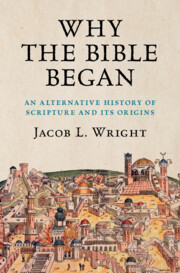Book contents
- Why the Bible Began
- Why the Bible Began
- Copyright page
- Dedication
- Contents
- Figures
- Maps
- Acknowledgments
- Prologue
- Introduction
- Part I The Rise and Fall
- Part II Admitting Defeat
- 9 Daughter Zion
- 10 The Creator
- 11 Haggai the Prophet
- 12 Nehemiah the Builder
- 13 Ezra the Educator
- 14 Hoshayahu the Soldier
- Part III A New Narrative
- Part IV A People of Protest
- Subject Index
- Scholars Cited
- Biblical References
- References
10 - The Creator
Comforting the Afflicted
from Part II - Admitting Defeat
Published online by Cambridge University Press: 13 July 2023
- Why the Bible Began
- Why the Bible Began
- Copyright page
- Dedication
- Contents
- Figures
- Maps
- Acknowledgments
- Prologue
- Introduction
- Part I The Rise and Fall
- Part II Admitting Defeat
- 9 Daughter Zion
- 10 The Creator
- 11 Haggai the Prophet
- 12 Nehemiah the Builder
- 13 Ezra the Educator
- 14 Hoshayahu the Soldier
- Part III A New Narrative
- Part IV A People of Protest
- Subject Index
- Scholars Cited
- Biblical References
- References
Summary
These first lines of Handel’s Messiah are drawn from poetry that an anonymous group of Judean scribes known collectively as Second Isaiah composed to comfort their people in the wake of Babylon’s devastation of Judah. The first half of Isaiah (chapters 1–39) concludes with a foretelling of Judah’s suffering and downfall. Without pausing to describe the fulfillment of that disturbing forecast, the book begins anew with Second Isaiah’s stirring poems and prophecies.
- Type
- Chapter
- Information
- Why the Bible BeganAn Alternative History of Scripture and its Origins, pp. 153 - 168Publisher: Cambridge University PressPrint publication year: 2023



